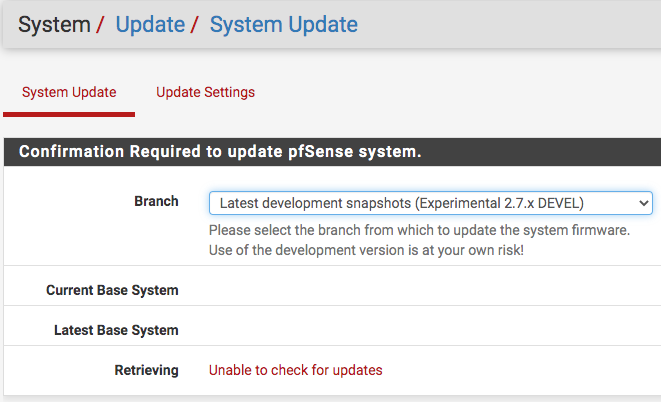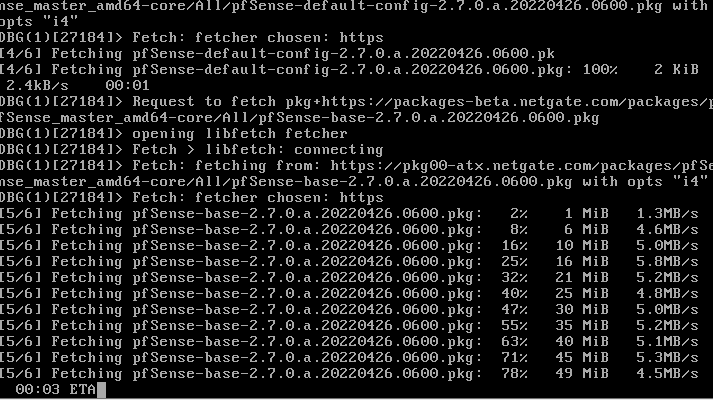[WORKAROUND] Unable to update and package install (ERROR: It was not possible to identify which pfSense kernel is installed)
-
@stephenw10 said in Unable to update and package install (ERROR: It was not possible to identify which pfSense kernel is installed):
Are you installing 2.7?
Yes, pfSense 2.7 CE
The config you are restoring is setting the repo to next-dev-version so if you are installing 2.6 and then restoring that it will cause it to try to use the wrong repo and fail.
You don't need to install packages before restoring is will pull them in at the first boot after the install.
I trying several times with and without installing packages before restoring from .xml backup file.
Result are the same.But it looks like you have some more general connectivity issue happening there. Those SRV records should resolve:
steve@steve-MMLP7AP-00 ~ $ host -t srv _https._tcp.packages.netgate.com _https._tcp.packages.netgate.com has SRV record 10 10 443 pkg00-atx.netgate.com. _https._tcp.packages.netgate.com has SRV record 10 10 443 pkg01-atx.netgate.com. steve@steve-MMLP7AP-00 ~ $ host -t srv _https._tcp.packages-beta.netgate.com _https._tcp.packages-beta.netgate.com has SRV record 10 10 443 pkg01-atx.netgate.com. _https._tcp.packages-beta.netgate.com has SRV record 10 10 443 pkg00-atx.netgate.com.Because ping/traceroute not working for anything excluding LANs, and ping are ok only for 1.1.1.1/8.8.8.8 I come with the same conclusion.
But where is the source of problem and how to find them?
-
@nollipfsense said in Unable to update and package install (ERROR: It was not possible to identify which pfSense kernel is installed):
Please Jim's note here below and why it's important to post in development section.
https://forum.netgate.com/topic/171891/update-failure-2-7-0-development-amd64-built-on-tue-apr-26-06-13-40-utc-2022-freebsd-12-3-stable
Thank You that point me.
Hm, I never imagine that Netgate was making so unstable upgrade...
-
@sergei_shablovsky said in Unable to update and package install (ERROR: It was not possible to identify which pfSense kernel is installed):
I never imagine that Netgate was making so unstable upgrade...
What?!
We specifically stopped updating the snapshot servers in order to shield end users from any instability these significant changes might introduce. The snapshot servers are still there and you can still pull pkgs from them. They are just not being updated currently. It will not prevent you accessing the servers.
You might be seeing an IPv6 issue. Try:
host -4t srv _https._tcp.packages-beta.netgate.comSteve
-
@stephenw10 said in Unable to update and package install (ERROR: It was not possible to identify which pfSense kernel is installed):
@sergei_shablovsky said in Unable to update and package install (ERROR: It was not possible to identify which pfSense kernel is installed):
I never imagine that Netgate was making so unstable upgrade...
What?!
We specifically stopped updating the snapshot servers in order to shield end users from any instability these significant changes might introduce. The snapshot servers are still there and you can still pull pkgs from them. They are just not being updated currently. It will not prevent you accessing the servers.
According stopping to updating snapshots to end users - totally agree with you.
You might be seeing an IPv6 issue. Try:
host -4t srv _https._tcp.packages-beta.netgate.comThank You, Steve.
The result are:
;;connection timed out; no servers could be reached -
Can it resolve anything?
Didn't you have an issue very similar to this previously?
-
@stephenw10 said in Unable to update and package install (ERROR: It was not possible to identify which pfSense kernel is installed):
Can it resolve anything?
Unfortunately, NO
Also I check ipv6 settings everywhere,- nothing used.
Didn't you have an issue very similar to this previously?
No any similar...
-
The problem come right after update from .xml backup file. Because of this I try to determine which section of .xml backup file impact on this: as I describe before, installing one-by-one. Trying installing packages before, and after restoring... But results are the same: all looks like ok, but after System section restoring - going to wrong state, and connection to outside partially loss..
I more than sure that with .xml backup file are all ok, because I make 3 copy of them on 3 different media.
-
Today I found that:
- if disable DNS Resolver
- reboot
- when enabling DNS Resolver
After pressing Save button on DNS Resolver webGUI page, the follow error appear on top of the page (not on separate pop-up or info/alert part of page, just on upper background):
Warning: file_put_contents(/var/unbound/sslcert.crt): failed to open stream: No such file or directory in /etc/inc/unbound.inc on line 314 Warning: chmod(): No such file or directory in /etc/inc/unbound.inc on line 315 Warning: file_put_contents(/var/unbound/sslcert.key): failed to open stream: No such file or directory in /etc/inc/unbound.inc on line 316 Warning: chmod(): No such file or directory in /etc/inc/unbound.inc on line 317 -
You have pfBlocker in the config but not installed perhaps?
-
It's saying update available today but still unable to update. I also tried installing pfBlockerNG, no luck.


-
Hmm, you should be able to update the to April 26th snap. What does
pkg -d updateshow? -
@stephenw10 Still does nothing then eventually goes back to the shell prompt.

-
Looks like a general connectivity issue then. Try:
pkg -d4 update -
@stephenw10 said in Unable to update and package install (ERROR: It was not possible to identify which pfSense kernel is installed):
You have pfBlocker in the config but not installed perhaps?
Yes, in .xml backup file must be settings for pfBlockerNG. But now there are no any packages installed, due error in connectivity...
-
@stephenw10 said in Unable to update and package install (ERROR: It was not possible to identify which pfSense kernel is installed):
Hmm, you should be able to update the to April 26th snap. What does
pkg -d updateshow?
Similar screen immediately, withpfSense repository is up to date All repositories are up to dateat the end of screen.
-
@stephenw10 said in Unable to update and package install (ERROR: It was not possible to identify which pfSense kernel is installed):
Looks like a general connectivity issue then. Try:
pkg -d4 updateThe same screen with “all are up to date”...
Need to note that 13) Update from console menu item in VGA console initiate update checking procedure and all looks like no any problem, just no new updates.
But Update from menu in webGUI (and also checking text string say “unable to ...”) give me the answer “Unable to check...”Also when I try to install package (any of them), follow error happens:
>>> Upgrading pkg... done. >>> Updating repositories metadata... Updating pfSense-core repository catalogue... Fetching meta.conf: . done Fetching packagesite.pkg: . done Processing entries: . done pfSense-core repository update completed. 7 packages processed. Updating pfSense repository catalogue... Fetching meta.conf: . done Fetching packagesite.pkg: .......... done Processing entries: .......... done pfSense repository update completed. 513 packages processed. All repositories are up to date. ERROR: Unable to compare version of pfSense-repo -
@stephenw10
Please look at my initial post, I mean on:ADDED
There are also some mismatching on SSH keys level, because after restoring System section from backup .xml and hardware rebooting not possible to logging in webGUI: browser pop-up with “This browser must to support cookies** appear.How to fix this?
-
Do not restore single config sections. Only restore the full config.
You are missing some pkgs as we showed earlier. Try to install those. You will not be able to upgrade again until they are present.
Steve
-
@stephenw10 That seems to be working...

-
@nollipfsense Ok so in your case it was an IPv6 connectivity issue.